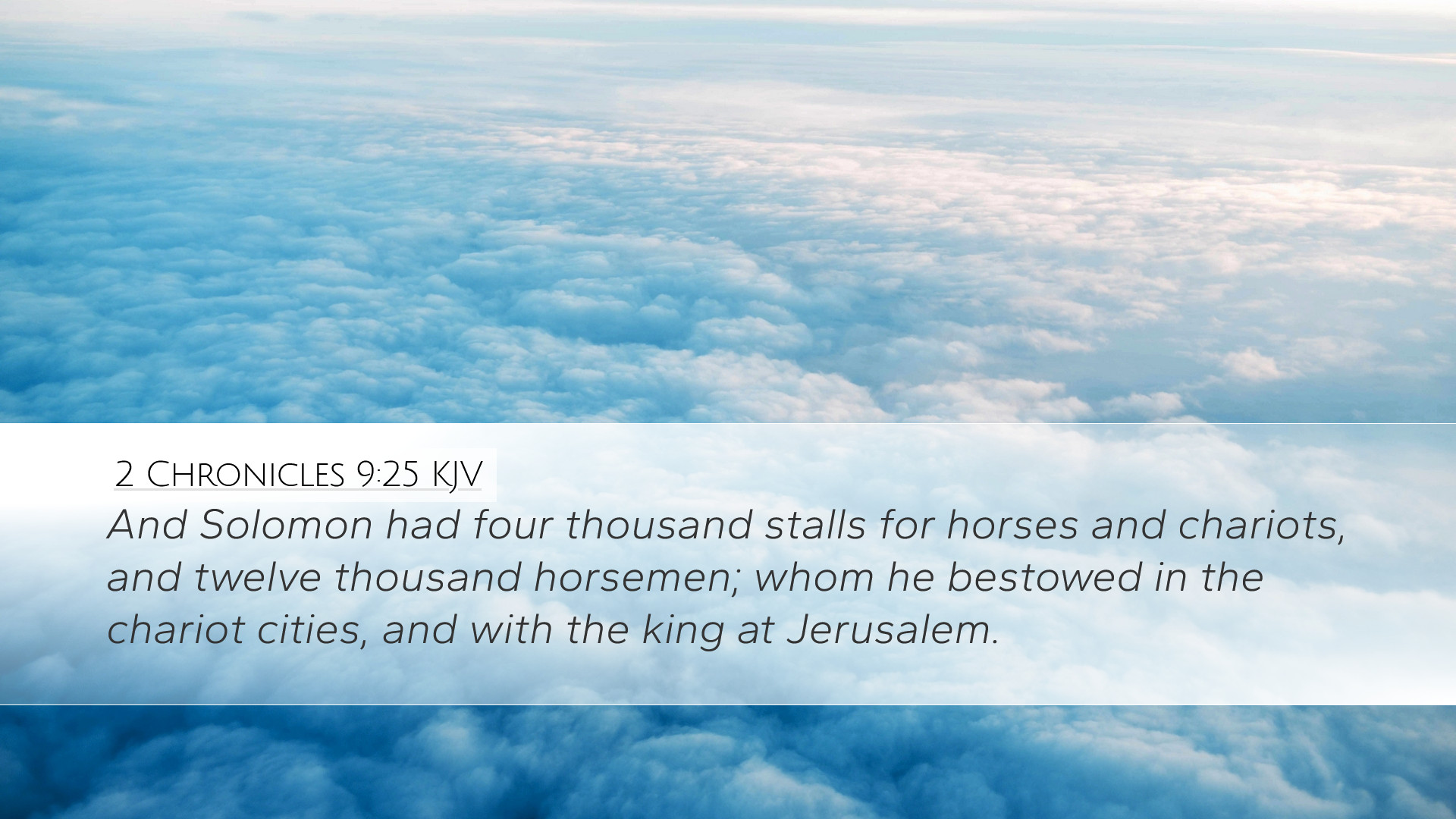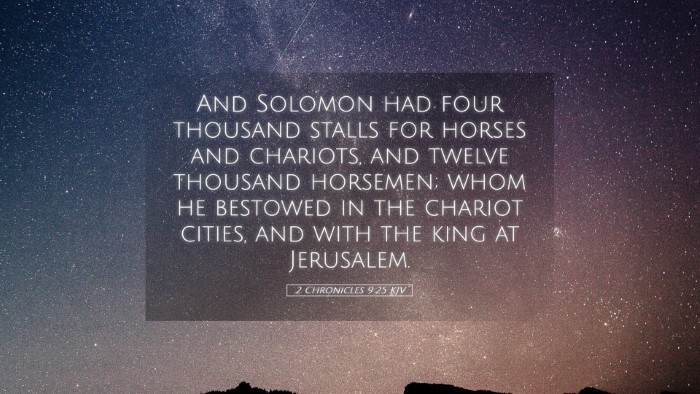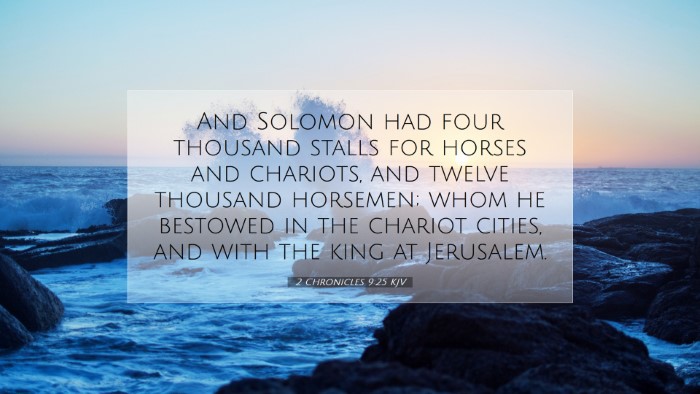Commentary on 2 Chronicles 9:25
Verse: "And Solomon had four thousand stalls for horses and chariots, and twelve thousand horsemen; whom he bestowed in the chariot cities, and with the king at Jerusalem."
Introduction
The verse in question provides a glimpse into the grandeur and organizational prowess of King Solomon's reign. It encapsulates both his military might and his administrative skills as he positioned his resources strategically to maintain stability and power in his kingdom. In this commentary, we will explore various aspects of this verse through insights drawn from prominent public domain commentaries, including those of Matthew Henry, Albert Barnes, and Adam Clarke.
Understanding the Historical Context
To appreciate the weight of 2 Chronicles 9:25, it is crucial to understand the context of Solomon's rule. Following the reign of David, Solomon ascended to the throne and established a period of unparalleled peace and prosperity in Israel. His achievements not only included monumental architectural projects like the Temple but also included strengthening Israel's military capabilities.
Military Organization
As noted by Matthew Henry, this verse highlights Solomon’s strategic foresight in military matters. The provisions of “four thousand stalls for horses” and “twelve thousand horsemen” illustrate not only his wealth but also his desire to ensure the security of his kingdom through a well-structured military force.
Albert Barnes adds that the depiction of “chariot cities” indicates specific locations dedicated to military resources, showcasing an organized approach that contrasted with the scattered and sometimes ineffective military arrangements of previous leaders.
The Symbolism of Chariots and Horsemen
The chariot and horsemen are significant symbols in the ancient Near Eastern context, often associated with strength and conquest. In Solomon’s time, possession of such resources was not merely a matter of wealth but a fundamental aspect of national identity and pride.
Adam Clarke emphasizes that Solomon's extensive cavalry was pivotal for both defense and expansion. This capability would allow him to project power beyond the borders of Israel and maintain peace with surrounding nations through strength. Thus, while the wealth and peace during Solomon's reign are well-known, the military organization he undertook was equally vital.
Divine Favor and Human Effort
This verse also resonates with the theme of divine blessing coupled with human endeavor. Solomon’s achievements were not solely the product of his strategic thinking but were also manifestations of God’s favor upon him, as earlier chapters reveal God’s promise to grant Solomon wisdom and wealth.
Matthew Henry observes that the careful preparation of Solomon’s military reflects an understanding that faith in God does not exclude prudent preparation for earthly challenges. This encourages the believer to balance faith with diligence in their undertakings.
Spiritual Insights and Application
The assembly of military resources under Solomon can be paralleled to the ways in which Christians today are called to prepare for spiritual battles. The Apostle Paul encourages believers to don the armor of God in Ephesians 6:10-18, suggesting that spiritual readiness entails both divine empowerment and human responsibility.
Albert Barnes suggests that just as Solomon amassed chariots and horsemen, Christians should cultivate the fruits of the Spirit and develop their spiritual gifts to effectively serve in the Kingdom of God, acknowledging the necessity of both divine assistance and personal effort.
A Reflection on Leadership Qualities
This verse also opens a dialogue on the attributes of effective leadership. Solomon’s ability to organize, allocate resources, and plan for the future underscores essential traits for leaders today—vision, prudence, and the responsibility to care for those under their guidance.
Adam Clarke notes that leaders are often required not just to dream but to act, utilizing their God-given resources wisely. Therefore, it encourages pastors and church leaders to reflect on their stewardship of resources—spiritual, physical, and financial—and to approach their roles with humility and wisdom.
Conclusion
2 Chronicles 9:25 provides more than just a record of military might; it invites reflection on the complexities of leadership, the balance of faith and action, and the organization of resources for the common good. The insights from historical and theological perspectives serve as a guiding compass for believers today. By learning from Solomon's example, pastors, scholars, and theologians can draw important principles relevant to ministry, stewardship, and personal spiritual growth.
Key Takeaways
- Strategic Planning: The importance of foresight and organization in leadership.
- Balance of Faith and Action: The interplay between divine blessing and human effort in achieving goals.
- Preparation for Spiritual Warfare: Emphasizing the need for readiness in all aspects of life.
- Stewardship: Reflecting on responsible management of resources entrusted to leaders.


